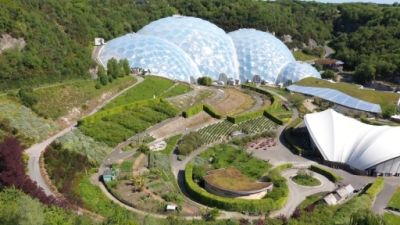Eden Project to begin £17m drilling project so hot rocks can 'superheat' water in Cornwall

Watch Claire Manning's report
The next stage of a geothermal heat and power project at a Cornwall tourist attraction is set to get underway.
The Eden Project in St Austell plans to use hot rocks beneath the surface of the Earth to 'superheat' water for use around the site.
Next week the first lorries carrying a 450-tonne, 55 metre-high drilling rig will arrive on the outer edge of the Eden Project grounds.
Once fully assembled into position on a newly-laid concrete platform the rig will be ready to drill 4.5km (nearly three miles) down into the Earth's granite crust.
How will the project generate hot water?
The first phase of drilling is expected to take five months and will allow water to be injected down the borehole to be superheated by the hot rocks beneath.
The hot water will then be pumped back to the top up a pipe suspended in the same borehole, generating heat initially to warm Eden's Rainforest and Mediterranean Biomes, offices, kitchens and greenhouses.
The same water will then be re-circulated to be superheated and used again.
If the first phase goes to plan the next phase is to drill a second well close to the first to a similar depth of around 4.5km.
The closed circulatory system of two wells will bring even more heated water to the surface for heating in the local area and also allow the generation of electricity from the hot water.
If the first two steps of the project are successful it will mean it can generate enough renewable energy for Eden to become carbon negative during 2023.
Research has shown when geothermal energy is developed it will be capable of providing around 20 per cent of the UK's current electricity demand plus a vast amount of heating.
In Germany the industry has created more than 22,000 skilled jobs and added €13.3billion to the German economy since 2000 while also reducing the country's emissions.
Eden Project Co-Founder Sir Tim Smit said: "Forget the official po-faced language about sustainability and our energy future… this is every romantic's dream. Jules Verne would be smiling, as would Brunel, as will every Briton worried that we had lost our island mojo.
"It is a privilege for Eden to be involved in a team embracing the future with the skills of the engineer and the power of the imagination, laying down a marker for a future that is ours to make."
The diggers rolled in autumn last year and despite some of the wettest weather seen in Cornwall in recent years the drilling apron, guide pipe, service roads, and water storage lagoon are ready to take delivery of the drilling rig.
A special viewing area has been put up so visitors can see the project safely from a nearby path.
How will the drilling work?
The first deep well will be drilled into the granite to a vertical depth of 4.5km. When the well reaches 2km, it will be steered to intersect with a naturally fractured zone in the granite.
Once the well is completed down to the anticipated terminal depth of 4.5km, an insulated pipe will then be inserted into the well down to the 3km point.
Cold water will be injected down the outside of the pipe where it meets the hot rock and the rock will act as a heat exchanger. The hot water then travels back up the inside of the pipe in a method known as a co-axial system.
The use of the heat will demonstrate the benefits of greenhouse gas savings achievable from this specific project, while also indicating the long-term level of heat and power that may be achieved from the subsequent two-well system.
Read more: